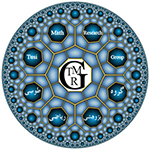Abstract
We show that under suitable conditions interpolation between a Banach space and its dual yields a Hilbert space at $\theta =\frac{1}{2}$. By application of this result to the special case of the non-commutative $L^p$-spaces of Leinert [Int. J. Math. 2 (1991), no. 2, 177-182] and Terp [J. Operator Theory 8 (1982), 327-360] we conclude that $L^2$ is a Hilbert space and that $L^p$ is isometrically isomorphic to the dual of $L^q$ without using the isomorphisms of these spaces to $L^p$-spaces of Hilsum [J. Funct. Anal. 40 (1981), 151-169.] and Haagerup [Colloq. Internat. CNRS, 274, CNRS, Paris, 1979].\Haagerup and Pisier [Canad. J. Math. 41 (1989), no. 5, 882-906.], Pisier [Mem. Amer. Math. Soc. 122 (1996), no. 585, viii+103 pp] and Watbled [C. R. Acad. Sci. Paris, t. 321, Série I, p. 1437-1440, 1995] gave conditions under which interpolation between a Banach space and its conjugate dual yields a Hilbert space at $\frac{1}{2}$. The result mentioned above when put in “conjugate form” extends their results.
Citation
Klaus Werner. "Complex interpolation and non-commutative integration." Adv. Oper. Theory 3 (1) 1 - 16, Winter 2018. https://doi.org/10.22034/aot.1611-1061
Information





